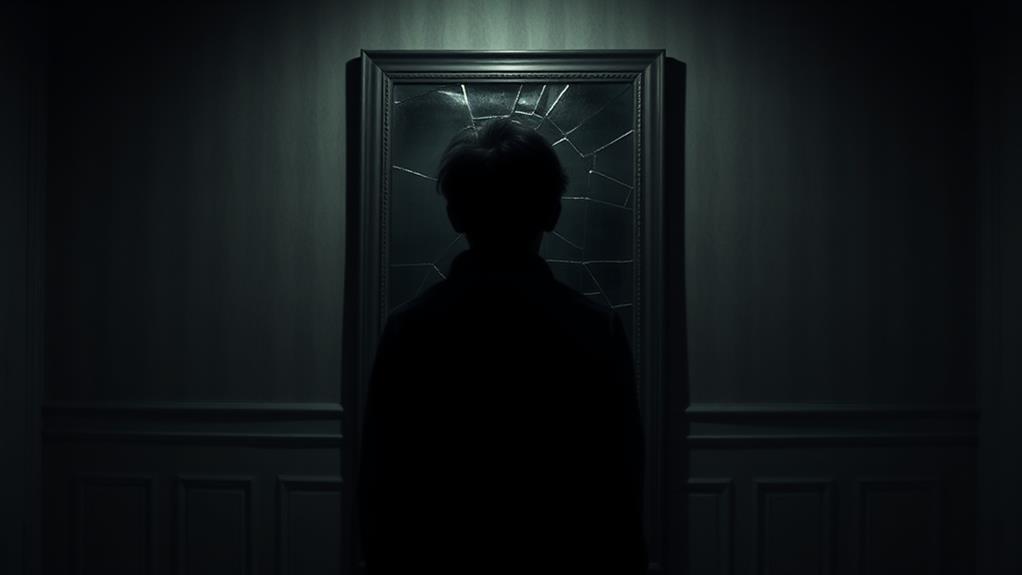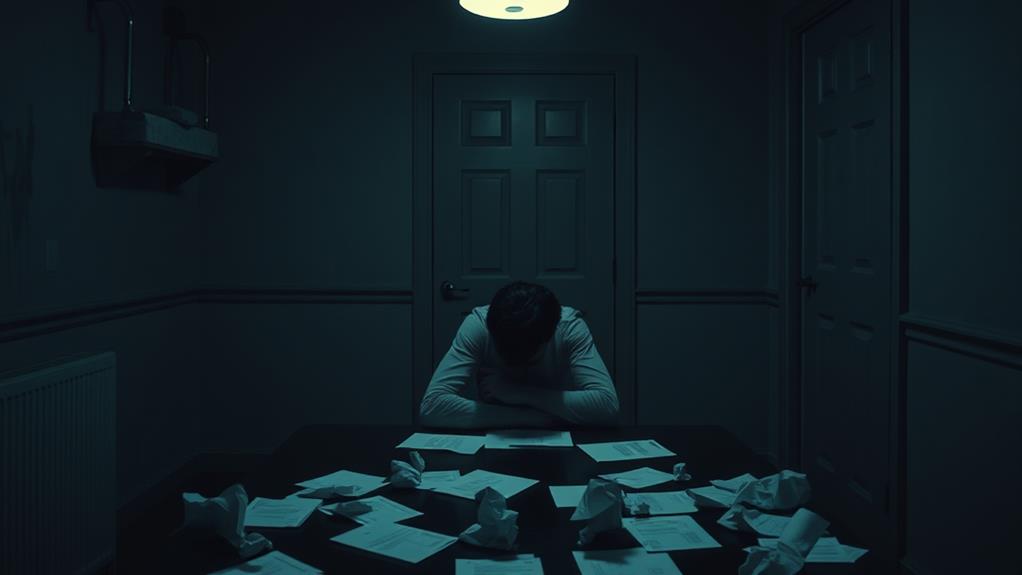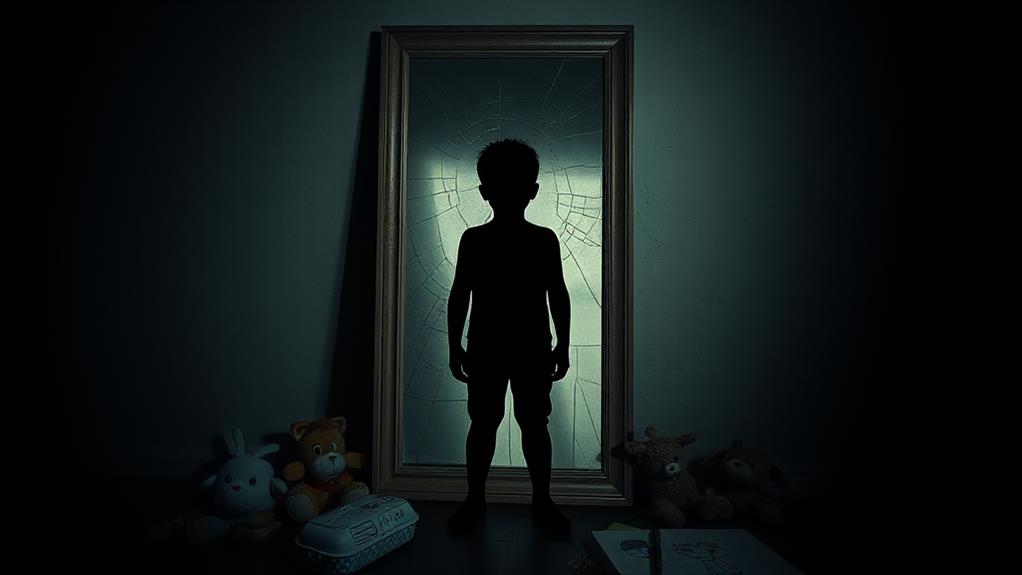You might not realize that some of your daily habits stem from childhood emotional abuse. Whether it's constantly doubting yourself or always trying to please others, these behaviors can quietly shape your life and relationships. You may find yourself avoiding conflict or struggling to trust those around you, leading to a cycle that's hard to break. Understanding the origins of these patterns is essential for your healing journey, but do you know which habits are rooted in your past? The answers could be eye-opening and might just change how you view yourself.
Constant Self-Doubt

Constant self-doubt often creeps in quietly, yet it can have a profound impact on your life. You might find yourself questioning your abilities or feeling unsure about your choices, and that can be exhausting.
It's like an annoying little insect buzzing around your head, whispering, "You can't do that!" or "What if you fail?" These thoughts often stem from childhood emotional abuse, where your feelings and achievements may not have been valued.
When you struggle with self-doubt, it can hold you back from trying new things. You might skip opportunities because you're afraid you won't measure up.
But guess what? Everyone has doubts, even the most successful people. The key is to recognize those nagging thoughts for what they are—just thoughts.
Try to challenge those negative beliefs. When you catch yourself thinking, "I'm not good enough," flip it around! Remind yourself of your strengths, and celebrate your successes, no matter how small.
Building confidence takes time, but with practice, you can silence that pesky self-doubt. Remember, you're capable of more than you think, so don't let those doubts keep you from shining!
People-Pleasing Tendencies
People-pleasing tendencies often emerge from a desire for approval and validation, especially when childhood emotional abuse makes you feel unworthy. You might find yourself constantly trying to make others happy, even if it means neglecting your own needs.
It's like being a superhero, but instead of saving the world, you're saving everyone else's feelings! You fear that if you don't please others, they mightn't like you or, worse, might abandon you.
You might say "yes" to things you don't want to do, just to avoid conflict or disappointment. This can lead to feeling drained, overwhelmed, and even resentful.
You might think, "Why am I doing this for them?" But deep down, it could be that little voice from your childhood, pushing you to seek approval at any cost.
It's important to recognize when you're doing this. Learning to set boundaries can help you reclaim your time and energy.
Start small! Practice saying "no" or asking for what you need. Remember, it's okay to prioritize yourself.
After all, you can't pour from an empty cup, and everyone deserves a full cup of happiness!
Difficulty Trusting Others

Many individuals who experienced childhood emotional abuse struggle with difficulty trusting others. You might find yourself constantly questioning people's intentions or feeling like you have to keep your guard up. It's tough, isn't it?
You may have learned early on that those who were supposed to care for you didn't always have your best interests at heart. This can lead to a habit of doubting others, even when they mean well.
When someone offers help, you might think, "What do they want from me?" It's a natural reaction, but it can get exhausting. You may miss out on friendships or support because you're afraid to let anyone in.
Remember, trusting someone doesn't mean you're weak; it means you're brave enough to take a chance.
Building trust takes time, sort of like trying to grow a plant. You need to water it carefully and give it sunlight.
Start small—share a little and see how it feels. You might be surprised at how good it can be to let someone in. Just take it one step at a time, and you'll be on your way to building those connections you've been missing.
Overthinking Every Situation
Overthinking every situation can feel like being stuck in a mental maze, where every choice leads to another twist and turn. You might find yourself replaying conversations in your head, wondering if you said the right thing or if someone was offended. It's like trying to solve a puzzle with missing pieces, and it can be exhausting!
This habit often stems from childhood emotional abuse, where you learned to question your feelings and actions constantly. You might feel like you have to analyze every detail to avoid making mistakes or upsetting someone. But guess what? Overthinking doesn't actually help you make better decisions; it just keeps you stuck in that maze longer.
Instead of spiraling into doubt, try taking a step back. Ask yourself if you're really in danger or if your mind is just playing tricks on you. You can even set a timer for five minutes to think about a situation, then let it go.
Avoidance of Conflict

When you spend so much time analyzing every possible outcome, it's easy to start avoiding conflict altogether. You might feel like tiptoeing around disagreements is the safer choice, but this habit can actually lead to more stress.
When you dodge confrontation, you miss out on addressing important issues, and that can build tension like a balloon ready to pop.
Maybe you think, "If I just keep the peace, everything will be fine!" But ignoring problems usually just makes them worse. You might find yourself feeling frustrated or even resentful because you didn't express how you truly felt. Communication is key, after all!
Avoiding conflict might seem smart at first, but it can leave you feeling unheard and alone. Instead of shying away, try dipping your toes into honest conversations. Start small—share your thoughts about a movie or a meal.
You'll build confidence to tackle bigger topics later. Remember, conflict isn't the enemy; it's an opportunity to grow and understand each other better.
Emotional Numbness
Often, you might find yourself feeling emotionally numb, as if your feelings are dulled or muted. This numbness can be confusing, especially when you want to feel happy, sad, or even excited. Instead, everything feels like a gray blur. You might laugh at a funny joke, but deep down, it doesn't seem to touch your heart.
This emotional numbness could be a result of childhood emotional abuse. When you faced tough situations as a kid, your mind might've decided to put up a wall to protect you. It's like your brain said, "Hey, let's not feel too much to avoid getting hurt!"
But now, that wall can make it hard to connect with your feelings or even with others. You might notice it's tough to enjoy things you once loved, like playing sports or hanging out with friends. It's a bit like watching a movie on mute; you see the action, but you're missing out on the fun sounds and feelings.
Fear of Abandonment

As you navigate relationships, a lingering fear of abandonment can cast a shadow over your connections. This fear often creeps in without you even realizing it, making you worry that people will leave you or stop caring. It can feel like a dark cloud hanging over every friendship, romantic relationship, or family bond.
You might find yourself clinging to others, constantly seeking reassurance that they won't go anywhere. You could also notice that you avoid getting too close to people, fearing that if you let them in, they might just walk away. It's like trying to build a sandcastle while the tide is coming in—scary, right?
You might even overthink things, imagining all the ways someone could suddenly up and leave. Understanding this fear is the first step to tackling it. Remember, just because someone cares for you doesn't mean they're going to abandon you.
Learning to trust and believe in your worth can help you create stronger, healthier connections. So, take a deep breath, and know you're not alone. You can work on this fear and build lasting relationships that feel safe and loving!
Perfectionism
Fear of abandonment can lead to another challenging habit: perfectionism. You might find yourself constantly aiming for perfection, feeling like anything less isn't good enough. This need for everything to be flawless can be exhausting! You may worry that if you make a mistake, others will judge you or, worse, leave you. So, you push yourself to meet impossible standards, often at the cost of your own happiness.
Perfectionism can show up in different ways. Maybe you spend hours on a project, fixing tiny details that most people wouldn't even notice. Or perhaps you avoid trying new things because you're scared of failing. It's like you're trapped in a cycle where you think that being perfect will keep everyone around you happy and secure.
But here's the kicker: nobody's perfect! Even superheroes have their off days.
Instead of letting perfectionism control you, try focusing on progress instead of perfection. Celebrate small wins and remember that it's okay to be human. Embracing your flaws can actually help you connect with others better.
Negative Self-Talk

While aiming for perfection, you might find yourself caught in a web of negative self-talk that undermines your self-worth. You know those little voices in your head that whisper, "You're not good enough," or "You'll never succeed"? Those pesky thoughts often stem from childhood emotional abuse. They can be super sneaky and make you doubt yourself, even when you're doing great things.
Every time you mess up, it's like those voices get louder, telling you that you'll always fail. It's tough, right? But here's the thing: you're not alone. Many people face this struggle, and it's okay to feel this way sometimes. It doesn't mean you're a bad person or that you won't achieve your goals.
Instead of listening to those negative thoughts, try flipping the script. When you catch yourself saying something mean, challenge it! Ask, "Is this really true?" You might just find that you're being way too hard on yourself.
Difficulty Setting Boundaries
Setting boundaries can feel like an uphill battle, especially if you've grown up in an environment where your feelings and needs were overlooked. You might find it tough to say "no" or express what you really want. It's like trying to swim upstream, right? You often worry about upsetting others or being seen as rude.
You might've learned that your needs didn't matter, so you put everyone else first. This habit can make it super hard to stand up for yourself. You may feel guilty for even thinking about your own needs. It's important to remember that you have every right to set boundaries, just like everyone else.
Start small. Maybe try saying "no" to something that doesn't feel right for you. It's okay to want space or time for yourself. Setting boundaries isn't selfish; it's a way to take care of your emotional health.
Just think of it like putting on your own oxygen mask first before helping others. You can do this! With practice, you'll find that setting boundaries becomes a little easier and might even lead to healthier relationships.
Imposter Syndrome

Imposter syndrome often creeps in, making you doubt your abilities and accomplishments, even when evidence suggests otherwise. You might feel like a fraud, thinking you don't deserve your success. It's like wearing a mask that hides your true self, and you're terrified someone will rip it off and expose you.
Deep down, you may even believe that you just got lucky or that you've fooled everyone around you. This feeling often roots back to childhood emotional abuse. Maybe you were constantly criticized or made to feel less than others, which can lead to these pesky doubts.
You might find yourself overworking, trying to prove your worth, yet still feeling unworthy. It's a tough cycle, isn't it?
You're not alone in this. Many people experience imposter syndrome, and it's okay to acknowledge those feelings. Start celebrating your achievements, no matter how small.
Give yourself credit for your hard work, and remember, it's perfectly normal to feel unsure sometimes. It doesn't make you any less talented or capable. So, take a deep breath, and let that inner critic take a back seat. You've got this!
Inability to Express Emotions
Emotions can feel like a tangled web, especially when childhood experiences have taught you to suppress them. You might find it hard to express what you truly feel. Instead of sharing your happiness, sadness, or anger, you bottle it all up. It's like having a soda can that's been shaken—eventually, it's going to explode!
When you grow up in an environment where showing feelings isn't okay, you learn to hide them. You might even think, "Why bother? No one cares anyway."
But here's the thing: emotions are a normal part of life. They help you connect with others and understand yourself better.
If you struggle to say, "I'm upset" or "I'm happy," it's okay. Many people share this challenge. Start small; try writing your feelings down or talking to a friend. You don't have to plunge into the deep end right away. Just dipping your toes in can make a difference.
Chronic Guilt

This feeling often ties back to childhood emotional abuse, where you were made to feel responsible for things beyond your control.
When you grow up in that environment, it's easy to adopt guilt as a default setting. You start to believe that mistakes are a big deal, and you can't shake the feeling that you need to apologize—constantly.
But here's the thing: everyone makes mistakes, and they don't define who you are.
Learning to let go of that guilt can feel like a refreshing change. So next time the guilt monster tries to show up, remind yourself that it's okay to be human.
You're not perfect, and that's perfectly fine! Just focus on learning and moving forward.
Overly Critical of Self
Being overly critical of yourself often stems from the harsh judgments you faced in childhood emotional abuse. You may find yourself constantly pointing out your mistakes and flaws, almost like you're your own worst enemy. This habit can make you feel stuck in a cycle of negativity. It's like wearing a pair of glasses that only shows the bad stuff.
When you were a kid, if someone always told you that you weren't good enough, it's no wonder you've grown up feeling that way yourself. You might even catch yourself thinking that if you just criticize yourself enough, you'll somehow improve.
But here's the scoop: that kind of thinking rarely leads to growth. Instead, it can zap your energy and crush your spirit.
Imagine if you treated yourself like a close friend instead. You wouldn't berate them for a mistake; you'd encourage them and remind them that everyone messes up sometimes!
Shifting your perspective can take time, but it's so worth it. Start celebrating your small wins, and give yourself a break. After all, life's too short to be your own toughest judge!
Need for Approval

Growing up in an environment where your worth hinged on external validation can lead to a constant need for approval in adulthood. You might find yourself seeking compliments or reassurance from friends, family, or even strangers. It's like you're a plant desperately reaching for sunlight, hoping that someone will notice your efforts.
This habit can be exhausting! You may feel anxious if you don't receive that pat on the back or a thumbs-up. When you're constantly looking for approval, it's tough to trust your own judgment. You might think, "Am I doing this right?" instead of simply enjoying the moment.
Sometimes, you might even change your opinions or interests just to fit in. Imagine eating broccoli when you'd rather have pizza, all because you think others would approve! While wanting to be liked is normal, it can become overwhelming if it stems from childhood experiences.
Recognizing this need for approval is the first step toward breaking the cycle. You can start by valuing your own opinions and giving yourself the approval you've always sought from others.
After all, you're pretty amazing just as you are!
Isolation From Others
This habit of isolating yourself can stem from childhood experiences. When you've faced emotional abuse, you might learn to keep your feelings hidden and your distance maintained.
You might think you're protecting yourself, but this can build a wall that's hard to break down.
It's important to remember, though, that you don't have to wear that cloak all the time. You can take small steps to connect with others.
Maybe start with a text or a simple hello. You might be surprised at how much lighter you feel when you share a laugh or a story.
Hypervigilance

Many people who've experienced childhood emotional abuse find themselves in a state of hypervigilance, constantly on high alert for potential threats. This means you might feel like you're always watching your surroundings, ready to react to anything that seems off. It's as if you've got an internal alarm system that never turns off.
You might notice you're super sensitive to others' moods, always trying to predict what's coming next. While being aware can help you stay safe, it can also be exhausting. You may find it hard to relax or enjoy simple moments because your mind keeps scanning for danger. It's like being a deer in headlights—always ready to bolt!
Sometimes, this hyper-awareness can lead to misunderstandings. You might misinterpret someone's joke or friendly gesture as a threat, when really, they just want to be nice. Remember, it's okay to take a break from being on guard.
Practicing mindfulness or even just taking deep breaths can help you find a little peace. You deserve to feel safe and relaxed, so don't hesitate to give yourself permission to let your guard down sometimes. After all, life's too short to spend it in fight-or-flight mode!
Discomfort With Intimacy
Intimacy can feel like a double-edged sword for those who've faced childhood emotional abuse. You might crave closeness but also feel scared of it. It's confusing, right? When you've been hurt before, letting someone in can feel risky. You may question whether they'll leave or hurt you like others did.
Sometimes, you might find yourself backing away when someone tries to get close. It's like your heart has an invisible wall. You think, "I want to be close, but also, no thanks!" This can lead to misunderstandings, where friends or partners feel pushed away. They may think you don't care, while you're just trying to protect yourself.
You might notice that physical closeness makes you anxious. Hugs or cuddles can feel overwhelming. It's okay to feel this way; you're not alone! Recognizing this discomfort is the first step to working through it.
With time and patience, you can learn to trust again. Building healthy relationships can help you enjoy intimacy without fear. So, take small steps, breathe, and remember, it's okay to feel vulnerable. You're on a journey, and every little step counts!
Trouble Accepting Compliments

Accepting compliments can be just as challenging as getting close to others when you've experienced childhood emotional abuse. You might feel awkward or even question the person's sincerity when they say something nice about you. Instead of feeling happy, you may brush it off or say, "Oh, it was nothing!"
It's like trying to catch a butterfly; the more you chase it, the harder it's to hold onto. This struggle often comes from a place where you felt your worth was ignored or belittled. Growing up, you mightn't have received the praise you deserved, so now, when someone compliments you, it can feel foreign or even scary.
You might worry that if you accept the compliment, it'll jinx your good fortune, or maybe you think you don't deserve it at all. But guess what? You do deserve those kind words!
Try to take a deep breath and simply say, "Thank you." It's a small step, but it can make a big difference. Remember, accepting a compliment doesn't mean you're bragging; it just means you're starting to believe in yourself a little more.
Self-Sabotaging Behaviors
Self-sabotaging behaviors often sneak into your life when you least expect them, undermining your progress and happiness. You might find yourself procrastinating on important tasks or pushing away people who genuinely care about you. It's like having a little gremlin inside, whispering doubts and fears, making you question your worth.
Sometimes, you might avoid pursuing your goals because deep down, you fear you won't succeed. This fear can stem from childhood emotional abuse, where you learned that success was followed by criticism. So, you convince yourself that you're not good enough, even when you really are.
You may also notice that you get anxious about good things happening, worrying they'll be taken away. It's a sneaky pattern that can keep you stuck in a cycle of disappointment.
Remember, it's okay to feel this way, but it's also important to break the cycle. Start by recognizing these behaviors and gently challenge them. Celebrate your small victories and remind yourself that you deserve happiness.
With time, you can learn to replace those self-sabotaging thoughts with more positive ones, allowing yourself to thrive instead of just survive.

